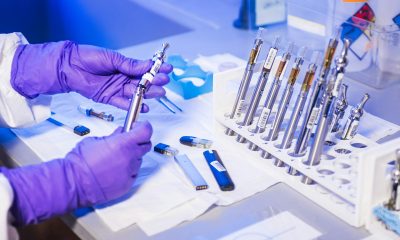Biotech
The CNAG Consolidates Leadership in Genomic Medicine with Over 1,100 Projects in 2024
The CNAG closed 2024 as a leader in precision medicine, doubling sequencing capacity and advancing diagnostics for complex diseases. It contributed to major projects, including rare disease research and immune system mapping. With cutting-edge technology, 125 publications, and €23M in new projects, CNAG is shaping a more personalized, efficient, and equitable healthcare system.

The National Center for Genomic Analysis (CNAG) has closed 2024 with a balance sheet that consolidates its role as one of the scientific pillars of precision medicine in Spain and Europe.
With a doubled sequencing capacity—up to 200 human genomes per day—and a renewed technological platform with the most cutting-edge instruments, the data generated by the CNAG is not only redefining biomedical research but also directly impacting the diagnosis and treatment of complex diseases.
The CNAG has closed 2024 with a balance sheet that consolidates its role as one of the scientific pillars of precision medicine in Spain and Europe.
One of the main indicators of the CNAG’s impact on public health is the number of projects undertaken: 1,151 in 2024, with the participation of 243 user entities, including research centers, hospitals, and companies. Of these, 63% were from academic institutions, 32% from hospitals, and 5% from industry. A total of 14,350 samples were processed, reflecting the volume and robustness of the work carried out at its Barcelona facilities.
CNAG intensified involvement in personalized medicine
Over the past year, the CNAG has intensified its involvement in personalized medicine. As the coordinating node of the IMPaCT-Genomics infrastructure of the Carlos III Health Institute , it participates in a strategic network to implement this discipline in the Spanish healthcare system. Thanks to its technology and bioinformatics expertise, the center has contributed to the diagnosis of children with neuromuscular diseases, a field historically marked by diagnostic difficulties.
One example is the joint study with the Sant Joan de Déu Hospital, in which 23 children were diagnosed who had not received a response for years. Thanks to whole-genome analysis and other omics techniques, the diagnosis rate increased from 15% to 40%. This result represents not only a technical advance but also a concrete improvement in the quality of life for patients and families.
International projects
Among the milestones for 2024 , the CNAG’s participation in European projects such as “1+ Million Genomes” and the cellular atlas of human tonsils stands out, essential for understanding the biology of the immune system and its involvement in hematological diseases . This latest work, published in Immunity, identified 121 cell types after analyzing more than 550,000 cells and has been key to better understanding chronic lymphocytic leukemia.
The cell atlas identified 121 cell types after analyzing more than 550,000 cells, and has been key to better understanding chronic lymphocytic leukemia.
CNAG has also played a leading role in the genetic characterization of 50 lemur species, a study published in Nature Ecology & Evolution that, while focused on biodiversity, also opens the door to a better understanding of the evolution of certain genes associated with human diseases.
Technology at the service of clinical research
The center’s technological infrastructure is one of its greatest assets. In 2024, it incorporated state-of-the-art sequencing equipment, such as the Illumina NovaSeq X Plus (capable of generating 16 terabases per run) and the PacBio Revio for high-precision long reads. These platforms allow for addressing everything from rare diseases to large population cohorts, such as the 6,000 individuals sequenced as part of the “Genome of Europe” project.
In 2024, it incorporated next-generation sequencing equipment, such as the Illumina NovaSeq X Plus and the PacBio Revio for high-precision long reads.
In the field of spatial genomics, the Xenium Analyzer enables the study of gene expression at subcellular resolution, with applications in pathologies such as brain cancer or rheumatoid arthritis . In fact, in a project led by the Vall d’Hebron Research Institute (VHIR), spatial transcriptomics, proteomic quantification, and machine learning models were combined to predict the response to biological drugs.
Science with a seal of quality
Quality is a hallmark of CNAG. In 2024, it renewed its UNE-EN ISO/IEC 17025 and ISO 9001 certifications and successfully completed its first audit to obtain ISO/IEC 27001 in information security. It also led two European interlaboratory schemes to assess the quality of genomic analysis in somatic and germline DNA, involving 20 sequencing centers.
This is in addition to its role as the only European provider certified by Dovetail Genomics, and its leadership in the development of genomic best practices for the “1+ Million Genomes” initiative.
The CNAG published 125 scientific articles in 2024, 71% in top-quartile journals and 75% open access. Four doctoral theses were also defended in collaboration with national universities, and its team participated in more than 15 international courses, covering everything from cancer and rare diseases to biodiversity and functional genomics.
Genomics to transform healthcare
The RD-Connect GPAP platform, developed by CNAG, continues to be a benchmark in the integrated analysis of genomic and clinical data. With more than 39,000 cases in its database and 1,800 registered users, it has facilitated the diagnosis of multiple rare diseases and has begun its adaptation to cancer analysis. In terms of outreach, more than 700 people visited the center, and 116 outreach activities were organized , including workshops for students, visits from patient associations, and a prominent participation in the European Congress of Human Genetics in Berlin.
The CNAG is laying the foundations for more personalized, efficient, and equitable medicine
The CNAG’s journey in 2024 reflects how basic and applied science can converge for the direct benefit of the healthcare system. Its data, research, and tools not only respond to current challenges but are laying the foundations for more personalized, efficient, and equitable medicine.
With a total investment of €14.1 million and more than €23 million in new competitive projects, the CNAG is consolidating its position as a key player in the biomedical ecosystem. At a time when precision medicine is projected as a strategic axis of the future of healthcare, its work is undoubtedly a model to follow.
__
(Featured image by Warren Umoh via Unsplash)
DISCLAIMER: This article was written by a third party contributor and does not reflect the opinion of Born2Invest, its management, staff or its associates. Please review our disclaimer for more information.
This article may include forward-looking statements. These forward-looking statements generally are identified by the words “believe,” “project,” “estimate,” “become,” “plan,” “will,” and similar expressions. These forward-looking statements involve known and unknown risks as well as uncertainties, including those discussed in the following cautionary statements and elsewhere in this article and on this site. Although the Company may believe that its expectations are based on reasonable assumptions, the actual results that the Company may achieve may differ materially from any forward-looking statements, which reflect the opinions of the management of the Company only as of the date hereof. Additionally, please make sure to read these important disclosures.
First published in GACETA MEDICA. A third-party contributor translated and adapted the article from the original. In case of discrepancy, the original will prevail.
Although we made reasonable efforts to provide accurate translations, some parts may be incorrect. Born2Invest assumes no responsibility for errors, omissions or ambiguities in the translations provided on this website. Any person or entity relying on translated content does so at their own risk. Born2Invest is not responsible for losses caused by such reliance on the accuracy or reliability of translated information. If you wish to report an error or inaccuracy in the translation, we encourage you to contact us

-

 Fintech1 week ago
Fintech1 week agoFintower Secures €1.5M Seed Funding to Transform Financial Planning
-

 Impact Investing4 days ago
Impact Investing4 days agoBNP Paribas Delivers Record 2025 Results and Surpasses Sustainable Finance Targets
-

 Biotech2 weeks ago
Biotech2 weeks agoTwogee Biotech Advances Industrial Enzyme Solutions for Circular Production
-

 Crypto14 hours ago
Crypto14 hours agoUniswap and BlackRock Partner to Launch BUIDL in DeFi














